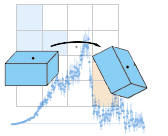
| HOME | PEOPLE | RESEARCH | ACADEMICS | TRAVEL/VISITORS | LINKS | CONTACT |

|
Web Mail
Mailing Lists
Computing Resources
Site Map
Distributed Control of Multi-Agent Systems: An Optimization-Based Approach
William Dunbar, Control and Dynamical Systems, Caltech
Thursday, February 12, 20045:00 PM to 6:00 PM
Steele 102
Multi-agent systems arise in several domains of engineering. Examples include arrays of sensor networks for aggregate imagery, autonomous highways, and formations of unmanned aerial vehicles. In these contexts, the individual subsystems are governed by dynamics and the control objective is achieved by cooperation. Cooperation refers to the agreement of the subsystems to 1) have a common objective with neighboring subsystems, with the objective typically decided off-line, and 2) share information on-line to realize the objective. To be viable, the control approach for these types of systems should be distributed, rather than centralized. This is particularly true when the scale of the overall system is large.
Optimization-based techniques are suited to multi-agent problems, in that such techniques can admit very general objectives. Receding horizon control is an optimization-based approach that is applicable when dynamics are present. Several researchers have recently explored the use of receding horizon control to achieve multi-vehicle objectives. In most cases, the common objective is formulated, and the resulting control law implemented, in a centralized way. In this talk, a means of distributing the receding horizon control law is outlined. The resulting control law is provably asymptotically stabilizing, as well as scalable. The example of multi-vehicle formation stabilization will be used as a venue for the theory.
|
©2003-2011 California Institute of Technology. All Rights Reserved webmaster |
|